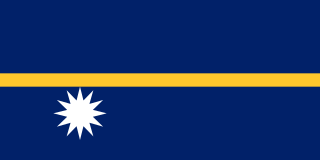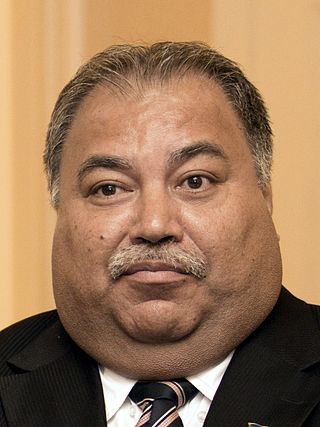| |||||
| Decades: | |||||
|---|---|---|---|---|---|
| See also: | |||||
The following lists events that happened during 2006 in the Republic of Nauru .
| |||||
| Decades: | |||||
|---|---|---|---|---|---|
| See also: | |||||
The following lists events that happened during 2006 in the Republic of Nauru .

Nauru, officially the Republic of Nauru and formerly known as Pleasant Island, is an island country and microstate in Micronesia, part of the Oceania region in the Central Pacific. Its nearest neighbour is Banaba of Kiribati, about 300 km (190 mi) to the east.

History of Nauru, is about Nauru, an island country in the Pacific Ocean. Human activity is thought to have begun roughly 3,000 years ago when clans settled the island. A people and culture developed on the island, the Nauru which had 12 tribes. At the end of the 1700s, a British ship came, and this was the first known contact with the outside world. The British ship called it "pleasant island" and it was a friendly greeting; the British sailed on. Thirty years later, in 1830, an escaped Irish convict took over the island and was finally evicted in 1841. There were scattered interactions with passing vessels and trade. In the mid-to-late 19th century, a devastating civil war started, which took the lives of many Nauru. This war was ended when Germany annexed the island in 1888, and negotiations ended the fighting. In the 1900s, phosphate mining started, and the Germans built some modern facilities on the island. German control ended at the end of World War I, and it was passed to Australia as protectorate. This continued until WW2, when the Empire of Japan invaded the island. Although it was occupied for a few years, many Nauru died at this time, and much of the population was deported from the island and/or used for slave labor. With the surrender of Japan, the Nauru were returned to the island, and it was put under Australian administration again, under the condition it would become independent. This happened in 1968, and Nauru has been a stable democracy since that time. In the last three decades of the 20th century, Nauru had enormous per capita wealth from the phosphate mining, to the point they were some of the richest people on the planet. However, when this ended and the investments were depleted, it has had a harder time, and international aid is important in the 21st century.

The politics of Nauru take place in a framework of a parliamentary representative democratic republic, whereby the President of Nauru is the head of government of the executive branch. Legislative power is vested in both the government and the parliament. The Judiciary is independent of the executive and the legislature.
Nauru has one government-owned radio station and two television stations, one of which is government owned. The island has telephone service under country code 674. The island's Internet service is provided by CenPacNet and Digicel Nauru. The country's ccTLD is .nr.

Nauru, following independence from the United Kingdom, became a sovereign, independent republic on 31 January 1968. Nauru has established diplomatic relations with a number of nations, including most of its Pacific neighbors with which it maintains economic, cultural and administrative ties.
Nauru Air Corporation, trading as Nauru Airlines, is the flag carrier of the Republic of Nauru. It operates scheduled international services to other Pacific islands and Australia. Its main base is Nauru International Airport. Its head office is on the property of Nauru International Airport, Yaren District and its operations office is in Brisbane in the Australian state of Queensland. In August 2014, the airline changed its name from Our Airline to Nauru Airlines.

In late August 2001, the Howard government of Australia refused permission for the Norwegian freighter MV Tampa, carrying 433 rescued refugees and 5 crew, to enter Australian waters. This triggered an Australian political controversy in the lead-up to the 2001 federal election, and a diplomatic dispute between Australia and Norway.

The Pacific Solution is the name given to the government of Australia's policy of transporting asylum seekers to detention centres on island nations in the Pacific Ocean, rather than allowing them to land on the Australian mainland. Initially implemented from 2001 to 2007, it had bipartisan support from the Coalition and Labor opposition at the time. The Pacific Solution consisted of three central strategies:

Australian immigration detention facilities comprise a number of different facilities throughout Australia, including the Australian territory of Christmas Island. Such facilities also exist in Papua New Guinea and Nauru, namely the Nauru Regional Processing Centre and the Manus Regional Processing Centre.

The Nauru Regional Processing Centre is an offshore Australian immigration detention facility in use from 2001 to 2008, from 2012 to 2019, and from September 2021. It is located on the South Pacific island nation of Nauru and run by the Government of Nauru. The use of immigration detention facilities is part of a policy of mandatory detention in Australia.

Marcus Ajemada Stephen is a Nauruan politician and former sportsperson who previously was a member of the Cabinet of Nauru, and who served as President of Nauru from December 2007 to November 2011. The son of Nauruan parliamentarian Lawrence Stephen, Stephen was educated at St Bedes College and RMIT University in Victoria, Australia. Initially playing Australian rules football, he opted to pursue the sport of weightlifting, in which he represented Nauru at the Summer Olympics and Commonwealth Games between 1990 and 2002, winning seven Commonwealth gold medals.

Oceania is, to the People's Republic of China and the Republic of China, a stage for continuous diplomatic competition. The PRC dictates that no state can have diplomatic relations with both the PRC and the ROC. As of 2024, eleven states in Oceania have diplomatic relations with the PRC, and three have diplomatic relations with the ROC. These numbers fluctuate as Pacific Island nations re-evaluate their foreign policies, and occasionally shift diplomatic recognition between Beijing and Taipei. The issue of which "Chinese" government to recognize has become a central theme in the elections of numerous Pacific island nations, and has led to several votes of no-confidence.

Baron Divavesi Waqa is a Nauruan politician who currently serves as the secretary-general of the Pacific Islands Forum. He was the President of Nauru from 11 June 2013 until 27 August 2019. He previously served as Minister of Education from 2004 to 2007.
Muhammad Faisal is an Iraqi refugee who was detained on the island of Nauru between 2001 and 2006 under the Australian Government's "pacific solution". Faisal became the second last Iraqi refugee to leave Nauru after he was initially refused a protection visa on the basis of an adverse security assessment issued by the Australian Security Intelligence Organisation (ASIO).

The Australian government has a policy and practice of detaining in immigration detention facilities non-citizens not holding a valid visa, suspected of visa violations, illegal entry or unauthorised arrival, and those subject to deportation and removal in immigration detention until a decision is made by the immigration authorities to grant a visa and release them into the community, or to repatriate them to their country of origin/passport. Persons in immigration detention may at any time opt to voluntarily leave Australia for their country of origin, or they may be deported or given a bridging or temporary visa. In 1992, Australia adopted a mandatory detention policy obliging the government to detain all persons entering or being in the country without a valid visa, while their claim to remain in Australia is processed and security and health checks undertaken. Also, at the same time, the law was changed to permit indefinite detention, from the previous limit of 273 days. The policy was instituted by the Keating government in 1992, and was varied by the subsequent Howard, Rudd, Gillard, Abbott, Turnbull, Morrison and Albanese Governments. The policy is regarded as controversial and has been criticised by a number of organisations. In 2004, the High Court of Australia confirmed the constitutionality of indefinite mandatory detention of non-citizens in Al-Kateb v Godwin. However, this interpretation was overturned in a landmark decision, NZYQ v Minister for Immigration, in 2023, with the High Court concluding the practice was unlawful and unconstitutional.
Soccer is a minor sport in the island country of Nauru. The country is not a member of FIFA.
Asylum in Australia has been granted to many refugees since 1945, when half a million Europeans displaced by World War II were given asylum. Since then, there have been periodic waves of asylum seekers from South East Asia and the Middle East, with government policy and public opinion changing over the years.

Education in Nauru is compulsory for children between the ages of 5 and 16. There are eleven schools in Nauru, including three primary schools and two secondary schools. There is an Able/Disable Centre for children with special needs. Education at these schools is free. In 2011, the Australian Department of Foreign Affairs and Trade reported that 3,026 children were enrolled at Nauru's schools. The previous Minister for Education was the Hon. Charmaine Scotty, MP from 2013. The current Minister is Asterio Appi.

Nauru competed at the 2020 Summer Olympics in Tokyo. Originally scheduled to take place from 24 July to 9 August 2020, the Games were postponed to 23 July to 8 August 2021, due to the COVID-19 pandemic. The country's participation in Tokyo marked its seventh appearance at the Summer Olympics since its debut in 1996.
The following lists events that happened during 2022 in the Republic of Nauru.